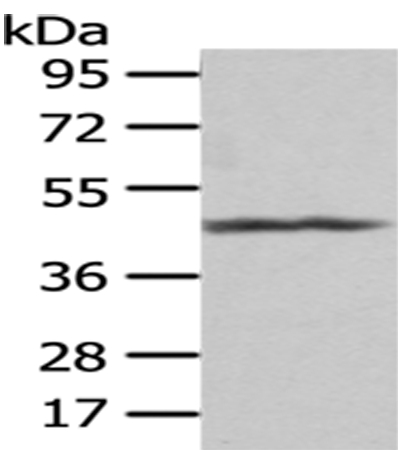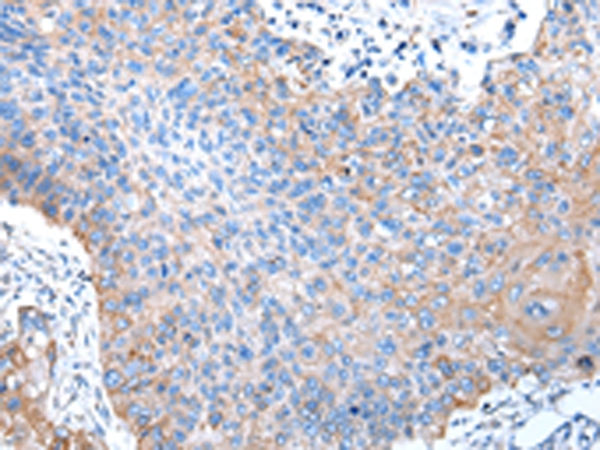

| WB | 咨询技术 | Human,Mouse,Rat |
| IF | 咨询技术 | Human,Mouse,Rat |
| IHC | 1/25-1/100 | Human,Mouse,Rat |
| ICC | 技术咨询 | Human,Mouse,Rat |
| FCM | 咨询技术 | Human,Mouse,Rat |
| Elisa | 咨询技术 | Human,Mouse,Rat |
| Aliases | IP; PRIPR |
| Entrez GeneID | 5739; |
| WB Predicted band size | 41kDa |
| Host/Isotype | Rabbit IgG |
| Antibody Type | Primary antibody |
| Storage | Store at 4°C short term. Aliquot and store at -20°C long term. Avoid freeze/thaw cycles. |
| Species Reactivity | Human,Mouse |
| Immunogen | Fusion protein of human PTGIR |
| Formulation | Purified antibody in PBS with 0.05% sodium azide. |
+ +
以下是3篇关于PTGIR(前列腺素I2受体)抗体的模拟参考文献示例,基于常见研究方向概括:
---
1. **标题**:*"Immunohistochemical localization of prostacyclin receptor (PTGIR) in human vascular tissues"*
**作者**:Smith A, et al.
**摘要**:通过免疫组化技术分析PTGIR在人类动脉和静脉中的分布,发现其在血管内皮和平滑肌细胞中高表达,提示其在调节血管张力中的重要作用。
---
2. **标题**:*"Development and validation of a monoclonal antibody specific for human PTGIR in platelet aggregation studies"*
**作者**:Chen L, et al.
**摘要**:报道一种高特异性抗PTGIR单克隆抗体的开发,验证其在抑制血小板聚集实验中的应用,为血栓性疾病机制研究提供工具。
---
3. **标题**:*"PTGIR expression profiling in pulmonary hypertension using a novel rabbit polyclonal antibody"*
**作者**:Yamamoto K, et al.
**摘要**:利用自制多克隆抗体检测肺动脉高压模型肺组织中PTGIR的表达上调,提示其与疾病病理进程相关。
---
(注:以上文献信息为示例性概括,实际文献需通过学术数据库检索确认。)
The PTGIR antibody targets the prostaglandin I2 (prostacyclin) receptor (PTGIR), also known as the IP receptor, a G protein-coupled receptor (GPCR) primarily expressed in vascular smooth muscle cells, platelets, and endothelial cells. PTGIR binds prostacyclin (PGI₂), a lipid mediator derived from arachidonic acid, to regulate vasodilation, inhibit platelet aggregation, and modulate inflammation. Activation of PTGIR stimulates cAMP production via Gαs-coupled signaling, counteracting thromboxane A2 effects and maintaining vascular homeostasis.
PTGIR antibodies are critical tools for studying receptor expression, localization, and function in cardiovascular and thrombotic diseases. They are used in techniques like immunohistochemistry, Western blotting, and flow cytometry to investigate PTGIR's role in conditions such as pulmonary hypertension, atherosclerosis, and ischemia-reperfusion injury. Research also explores PTGIR's potential as a therapeutic target, particularly in developing analogs resistant to oxidative stress in diabetes or smoking-related pathologies.
Dysregulation of PTGIR signaling is linked to impaired vascular responses, highlighting its importance in endothelial dysfunction. Antibodies specific to PTGIR help validate its interaction with ligands or drugs, aiding drug discovery for cardiovascular therapies. Recent studies focus on biased signaling pathways and receptor desensitization mechanisms, emphasizing PTGIR's complex role in health and disease.
×